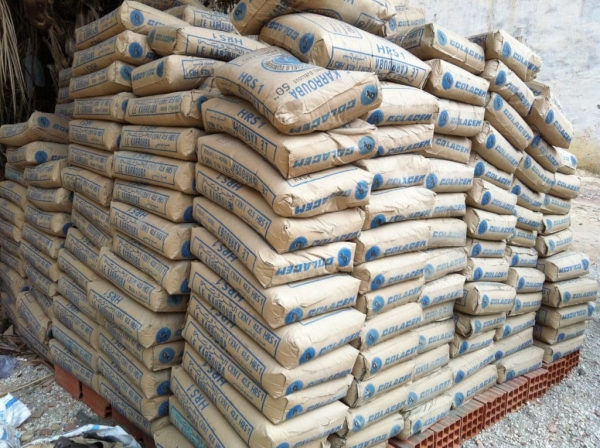Cement distributors in Lagos have stated that prices of the commodity might rise to levels seen earlier in the year during the next dry season when demand increases.
A review of prices across major cement distribution outlets reveals that prices have remained stable in the past four months following intervention from the federal government and the National Assembly. The price of a 50kg bag of cement ranges from N7,500 to N8,200.
Speaking on prices of the product, Ms. Halimat, a major cement distributor in Ikorodu said, “Now, we sell Elephant cement at N8,200 per bag and that’s the price for like two to three months now. No big difference between the price for Dangote and Elephant Cement for some time. I think it’s because of government intervention and the rainy season. Normally, demand is low during the rainy season as most construction work stops.”
Ms. Halimat’s views were confirmed by Mr. Idowu, who not only sells cement but also general building materials. He said that although prices are stable now, they are expected to rise when the dry season comes, and construction work picks up.
He said, “The drop in demand does not only affect cement but building materials in general but as construction works begin from maybe October or November, we’ll begin to see prices increases- that is how the market usually works but the one early this year was shocking and unexpected. I have been in this business for almost 20 years and I’ve not seen such a quick increase in cement prices. We have learnt now.”
N8,000 cement prices are not still cheap
However, another cement seller, Mr Enuwa disagreed that reduced demand for cement was due to the rainy season. According to him, reduced demand was caused by an increase in prices beyond the reach of average people to embark on large scale projects.
He said, “N8,000 for 50kg of cement is not cheap and that is not a stable price. How many people can build a house or any project at that price? We were selling cement around N5000 per bag this time last year and it increased to around N12,000 but dropping to the current price, that is not stable.”
He explained that the high prices of cement might deter developers from building at the regular full scale expected during the dry seasons.
Speaking on the cement price projection for the dry season, an official of the Dangote Group who requested anonymity said there is no reason to believe the opinions of cement distributors on the projected price increase.
According to him, prices are determined by different factors, not only demand, and it is difficult to project with certainty any increase in prices.
In his words, “What the distributors are telling you is what they think. It doesn’t mean it will happen. I cannot say for certain what will happen to cement prices when the dry season comes. It depends on different factors, and we have no control over some.”
Cement price increase earlier in the year
In February 2024, Nairametrics reported a spike in the price of cement from around N5,000 for 50kg bag to over N10,000 sending panic waves across the construction industry. It took the intervention of the federal government to rein on manufacturers that saw prices drop to N8000 after deliberations between the federal government led by Minister of Works led by Sen. David Umahi.
Prior to the hike, analysts at Cardinal Stone had projected that cement prices in 2024 would remain high due to the elevated inflationary environment, volatility in the foreign exchange market and high operational cost.
Nigerian businesses have not had it good with the foreign exchange market in 2024. The naira started the year trading at under N1000/$ and closed the first quarter at N1309/$ despite exchanging for as high as N1600 on the official window during the quarter.
The Cardinal report then diminished the likelihood of a price war between industry players in response to BUA’s price reduction in October 2023, stating that while it is slim, it is not impossible. It is worth knowing that in October 2023, the Chairman of BUA Group, Abdulsamad Rabiu stated his cement company will peg the price of cement at N3,500. The declaration proved to be mere lip service as neither developers nor distributors were able to buy at that price.
Impact of cement price increase on the housing sector
As hinted earlier by Mr. Enuwa, the cement distributor, the impact of the high cement prices could deter developers from starting new projects.
An earlier report by Nairametrics revealed that the 130% increase in building materials has stalled housing projects across the country with builders most hit due to the decline in jobs.
Furthermore, the increase in building materials like cement has negatively impacted the real estate sector as developers face losses over an unprecedented increase in the cost of building materials which impacts the entire real estate development sector.
[Nairametrics]

